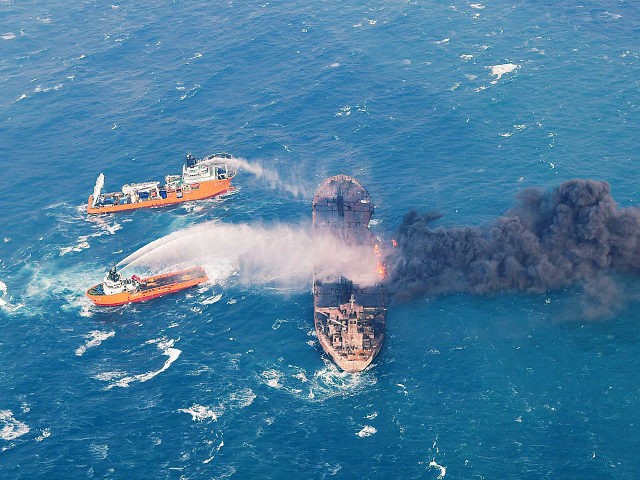Oil slicks are washing ashore in Japan after an Iranian tanker sunk in the East China Sea last month, local coastguards have confirmed.
Black clumps of oily compounds were first reported as washing up on the shores of shores of Takarajima island on January 28th, and that matter has since spread to 21 other islands across southwestern Japan known for their sandy beaches and delicate ecosystems.
Japanese officials tested matter that arrived on Okinoerabu and Yoron islands on February 8th and confirmed its source as from the sunken Sanchi oil tanker accident that killed all 32 of its crew members and caused major environmental concerns.
“Oily matter that arrived at the shores of the two islands is extremely likely to be linked to the Sanchi tanker incident, considering the similarity of the oil and the fact that there has not been any marine disaster involving oil spill in the nearby sea area,” a Coast Guard official told Reuters.
The oil tanker was transporting around 136,000 tonnes of a light oil known as condensate when it crashed into a bulk carrier around 160 miles off the coast of Shanghai.
Chinese, South Korean, and American authorities led an international rescue operation, although extreme weather conditions such as strong winds, high waves, and toxic fumes hindered the efforts.
Japanese environmental authorities previously said it was unlikely that such matter would reach their shores due to sea currents that would push the oil northwards.
“Oil spills in general can have a big environmental impact if they reach the coast, but we think that there is little chance of that happening on Japanese seashores for now,” a ministry official said last month. “From the area where the tanker sank, a sea current is heading to the north, limiting the chances of the oil slick reaching Japanese coasts.”
The spreading of oil to Japan will raise further concerns about the potential environmental damage of the spill, which has also contaminated waters outside China and South Korea.
Chinese propaganda outlet Global Times claims the incident will “prompt greater regulatory transparency to provide public access to information about all possible risks from oil pollution.”
“More importantly, the incident can be a much-needed wake-up call for China to work with its neighbors to develop an effective emergency preparedness system for marine pollution incidents,” they added.
Follow Ben Kew on Facebook, on Twitter at @ben_kew, or email him at bkew@breitbart.com.

COMMENTS
Please let us know if you're having issues with commenting.